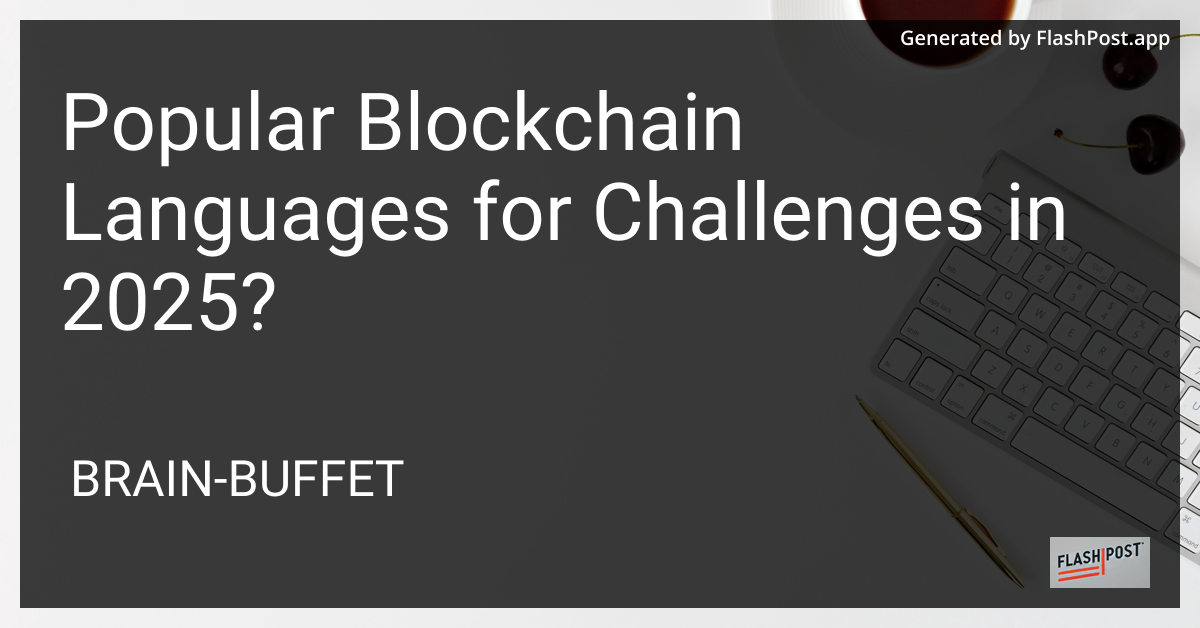Popular Blockchain Languages for Challenges in 2025?

Best Blockchain Books to Buy in 2025
| Product | Features | Price |
|---|---|---|
 Mastering Blockchain: Inner workings of blockchain, from cryptography and decentralized identities, to DeFi, NFTs and Web3, 4th Edition |
Buy it now 🚀  |
|
 The Basics of Bitcoins and Blockchains: An Introduction to Cryptocurrencies and the Technology that Powers Them (Cryptography, Derivatives Investments, Futures Trading, Digital Assets, NFT) |
Buy it now 🚀  |
|
 Blockchain: The Comprehensive Guide to Blockchain Development, Ethereum, Solidity, and Smart Contracts (Rheinwerk Computing) |
Buy it now 🚀  |
|
 The Bitcoin Standard: The Decentralized Alternative to Central Banking |
Buy it now 🚀  |
|
 Blockchain For Dummies |
Buy it now 🚀  |
As we venture into 2025, the blockchain landscape is ever-evolving, with new challenges and innovations emerging every day. The success of blockchain platforms hinges not only on their infrastructure but also on the programming languages that empower them. Here, we explore the popular blockchain languages in 2025 that are crucial for overcoming contemporary challenges.
Solidity: The Smart Contract Powerhouse
Solidity remains a dominant force in the blockchain ecosystem, primarily due to its integral role in Ethereum, one of the leading blockchain platforms. Known for its ease of use and intelligent contract capabilities, Solidity offers a robust toolkit for developers. As the Ethereum network evolves, addressing scalability and energy consumption issues, Solidity's adaptability and large developer community make it a staple for blockchain projects.
Rust: Safety and Efficiency at its Core
Rust has become increasingly popular for blockchain development, thanks to its emphasis on safety and performance. Platforms like Polkadot and Solana leverage Rust for building scalable and efficient blockchain solutions. The language’s memory safety features help in minimizing vulnerabilities, a crucial factor when addressing concerns of blockchain platforms comparison. Rust's concurrency capabilities also make it a fitting choice for handling the high-load environments typical of modern blockchains.
Golang: Known for Performance and Simplicity
Golang, or Go, is recognized for its performance, simplicity, and efficient concurrency management, making it well-suited for blockchain development. Go is the backbone for platforms like Hyperledger Fabric and helps in tackling the intricacies of blockchain technology efficiently. As blockchain applications become more complex and pervasive across industries, as seen in blockchain application in industries, Go’s ability to deliver reliable and high-performance solutions continues to be a game changer.
JavaScript: Versatility Meets Blockchain
JavaScript, with its unparalleled versatility, maintains its relevance in blockchain innovation. The rise of frameworks such as Node.js in blockchain development enhances its utility in creating decentralized applications (DApps) and web3 interfaces. JavaScript's extensive libraries and tools simplify development processes, providing scalable solutions for varied blockchain use cases. Its role in facilitating user-friendly blockchain interactions cannot be understated as the blockchain domain diversifies.
Python: Bridging Simplicity and Power
Python's simplicity and readability make it an excellent choice for blockchain development, especially for newcomers to the field. With strong support for data analytics and machine learning, Python empowers blockchain developers to create novel solutions that leverage data-driven insights. Python's rich ecosystem of libraries and frameworks allows developers to seamlessly integrate blockchain functionalities into more extensive systems, serving various industrial applications.
Conclusion
In 2025, the landscape of blockchain development is vast and intricate, necessitating languages that offer scalability, security, and performance. While Solidity continues to dominate with its smart contract proficiency, Rust, Golang, JavaScript, and Python each contribute uniquely to tackling modern-day challenges. As blockchain technology keeps advancing, these languages will continue to play pivotal roles in shaping innovative solutions across different sectors and industries. ```
This article provides a detailed exploration of the popular blockchain languages in 2025, optimized with relevant links and an illustrative image to engage readers and facilitate further exploration into related topics.